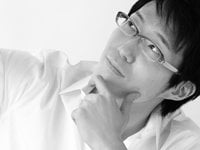Alessi's Toru electric kettle impresses at the breakfast table or at dinner parties with its creative design, where the kettle's handle passes directly through the body as a spout. This design explains the name of the kettle: the Japanese word "Toru" means "through". Designed by Nendo, the Toru kettle combines functionality with an elegant aesthetic that will delight in table settings year after year.
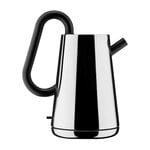
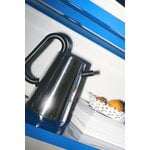
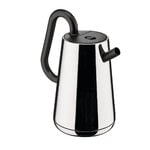
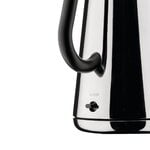
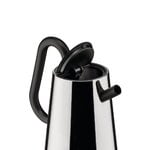
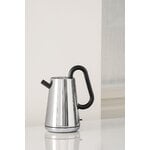
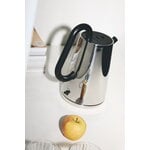
Toru electric kettle, 1,7 L, stainless steel - black
Alessi
Description
Alessi's Toru electric kettle impresses at the breakfast table or at dinner parties with its creative design, where the kettle's handle passes directly through the body as a spout. This design explains the name of the kettle: the Japanese word "Toru" means "through". Designed by Nendo, the Toru kettle combines functionality with an elegant aesthetic that will delight in table settings year after year.
Product details (11)
- Material
- Polished stainless steel, thermoplastic resin
- Colour
- Steel, black
- Length
- 25.5 cm
- Width
- 16.5 cm
- Height
- 30.5 cm
- Capacity
- 1.7 l
- Wattage
- 2,000–2,400 W
- Voltage
- 220–240 V
- Plug
- EU plug (type F)
- Notes
-
Separate power supply base.
Device cuts off the power supply if there is too little or no water in the kettle,
avoiding possible damage.
Removable filter retains any limestone particles formed inside the kettle. - Care instructions
- To clean the inside of the kettle, we recommend using water and vinegar. For the exterior and for the power supply, it is best to use a damp cloth.
- Product ID
Designer
Oki Sato established the design company Nendo in 2002. Nendo has offices in Tokyo and Milano an is active in many fields from architecture to interior design, product design and graphic design. Nendo has collaborated with many big companies in the fashion- and design industry. In 2011 they won the Design Award of the Year by Wallpaper magazine.
Would you like to read more about Nendo and their work? Discover our books:
Nendo
Reviews (2)
5
Based on 2 reviews
-
A
Anonyme
Paris, France
100 days ago
-
T
Tiina V
Tampere, Finland
Loistava
37 days ago
Sustainability
The Product Sustainability Framework, our criteria of sustainable design, helps you find the most sustainable products in our selection. Read below which sustainability criteria this product has met.
Working conditions & labour 8/9
-
Equal opportunities for all employees
-
Commitment to UN Global Compact, fair compensation for all employees
-
Corporate responsibility requirements defined and communicated for suppliers
-
Systematic work for improved inclusion and well-being in the workplace
-
Transparent supply chain
-
Suppliers' compliance to a code of conduct ensured
-
Direct suppliers audited and certified
-
Compliance to the UN Guiding Principles on Business and Human Rights ensured in the supply chain
-
Support for community involvement in the supply chain
Eco-friendly production 8/9
-
Fair and resource-wise water-use in production
-
No incineration or landfilling of returned items
-
No use of endangered species as materials
-
No direct environmental emissions or waste (excl. GHGs) from production
-
The sustainability of direct suppliers' production is addressed and monitored
-
Production and material sourcing that respect biodiversity, animal rights, and natural ecosystems
-
Material-efficient and ecological packaging
-
No potentially harmful chemicals used in own production
-
Positive impact on nature’s well-being through operations that regenerate natural ecosystems
Climate impact 3/8
-
Company's direct greenhouse gas emissions identified and commitment to reduction
-
Product's carbon impact identified and commitment to reduction
-
Guidance on energy- and eco-efficient use of the product
-
Contribution to climate initiatives beyond the brand’s direct operations
-
Low-carbon or compensated transportation
-
Carbon footprint of the product calculated and goals set to reduce it
-
100 % renewable energy in own production and operations
-
Carbon neutral or carbon negative product
Sustainable materials 5/6
-
Sustainable and long-lasting material choices
-
No harmful or hazardous substances
-
Responsible raw material sourcing and production
-
Materials suited for circularity: monomaterials, recyclable finishings, renewable or recycled contents etc.
-
Ecological materials: natural, biodegradable, recyclable or recycled contents
-
Outstanding materials in terms of innovativeness, responsibility, sustainability and circularity: local production or sourcing, 100 % recycled content, C2C-certification etc.
Circular design 5/5
-
High aesthetic quality promoting long-term use of the product
-
Technically durable product design and material choices
-
Design for enduring life-long quality
-
Design and support for product maintenance, repair and upgradability
-
Innovative circular design solutions: circular service system, resale platform, remanufacturing, collection of used products, etc.







